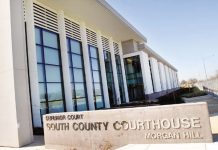More than a month after a woman and her dog were attacked by two
pit bulls and a mixed-breed dog along a levee on Uvas Creek, police
will not make tapes of 911 calls regarding the event available.
More than a month after a woman and her dog were attacked by two pit bulls and a mixed-breed dog along a levee on Uvas Creek, police will not make tapes of 911 calls regarding the event available.
“The bottom line is that we’re not going to release them,” Police Chief Denise Turner said.
Police want to keep the tapes private because the investigation is still active and to maintain the privacy of the 911 caller, Turner said.
Different states and local jurisdictions have different policies on the release of 911 recordings. For instance, on Nov. 5 police in Richmond released the 911 audio tape of a caller who reported the gang rape of a girl at Richmond High School on Oct. 24. On the other hand, the San Jose Police Department has reportedly denied access to 911 tapes in the shooting death by police of Daniel Pham in May, according to the San Jose Mercury News.
Doris Knapp, a 70-year-old ROP instructor at Gavilan College, broke her hand and arm Feb. 17 after two pit bulls attacked her 12-year-old chow mix, causing her to get caught in the leash and fall, she said. Her dog, Genghis, suffered non-life-threatening bite wounds.
A dispatcher told a witness who called 911 that police “don’t respond to dog-on-dog calls,” Knapp said after the incident.
A Computer Aided Dispatch report regarding the incident stated that the witness who called 911 hung up at some point and did not pick up the phone when dispatchers called back. Knapp later called police from her home to describe the incident, to inform them she was injured and to say she would be taking her dog to the veterinarian, the CAD report stated.
The Dispatch filed a Public Records Act request Feb. 24 for a copy of the 911 tapes of the incident in accordance with the California Public Records Act and the city’s Open Government Ordinance – both of which govern access to city and state documents. Police released the CAD report the next day. However, they denied access to the tapes of the calls, saying they are related to investigations being conducted by the Gilroy Police Department and the Santa Clara County Office of the District Attorney.
David Boles, records supervisor for Gilroy Police Department, cited Government Code Section 6254(f) as one of the reasons for not releasing the tapes. The code exempts from the release any “records of complaints to, or investigations conducted by, or records of intelligence information or security procedures of, the office of the Attorney General and the Department of Justice, the California Emergency Management Agency, and any state or local police agency.”
That exemption includes 911 tape recordings, Boles said. Releasing the tapes could jeopardize the investigation, Boles said. For instance, if the owner of the dogs knew the tapes had been released to the public, they may move out of the area or euthanize the dogs to avoid prosecution, he said.
In addition, releasing 911 tapes jeopardizes the privacy of people who are calling dispatchers and may deter people from reporting crimes, he said.
Generally, when police departments elsewhere release 911 recordings it is because they believe it will help the investigation, Boles said.
Gilroy Police Department does not release 911 tapes as a matter of policy, Chief Turner said.
“It’s not just this case,” she said. “It’s any case.”
The California Newspaper Publishers Association has contended that 911 tapes do not qualify as investigation records because they consist of information that people are calling in and reporting, CNPA legal counsel Jim Ewert said. However, there is not much case law on the subject, he said.
“There hasn’t been a whole lot of interpretive authority through the courts that support (CNPA’s) contention,” Ewert said.
While Gilroy police are correct in saying that they have a right to withhold the tapes under state law, they are not obligated to do so, Ewert said.
Ewert was encouraged to hear that Gilroy had an Open Government Ordinance, as few cities in California have such laws, he said. In addition to providing more access to documents, the Ordinance also creates an appeals process for parties making requests.
Boles contended that 911 tapes also are exempt from the Open Government Ordinance. The Ordinance states that withholding of information should be kept at a minimum and must be justified in writing, but it also makes allowances for exemptions allowed by the California Public Records Act.
Council members who sit on the city’s Open Government Commission would not comment on the case this week. However, they all said the Dispatch was welcome to forward the matter on to them for further review.
“I don’t want to say anything in any way to prejudge the issue, but I would encourage the Dispatch to follow that procedure,” said Councilman Perry Woodward, who chairs the Open Government Commission.
The Dispatch submitted a Public Records Act request to City Administrator Tom Haglund Wednesday following the initial request sent to police.
Gilroy Assistant City Attorney Jolie Houston responded Thursday with a letter stating that 911 records are exempt in accordance with the California Public Records Act. She also referenced Haynie v. Superior Court, a 2001 case in Los Angeles County regarding the arrest of 42-year-old Elgin Haynie by the Los Angeles County Sheriff’s Department. In that case, a judge denied Haynie access to a citizen’s call to report a possible crime and the department’s response after he was arrested and released without charge.
***
Timeline
Feb. 17: Pit bulls attack a dog owned by Gilroy resident Doris Knapp, causing her to fall down
Feb. 22: Police call Gilroy Dispatch regarding incident
Feb 24: Dispatch submits a Public Records Act request for 911 tapes regarding incident after Knapp says there were some errors in police reports
Feb. 25: Police Records Administrator David Boles denies request, but provides redacted copy of the Computer Assisted Dispatch report
April 7: Dispatch submits PRA request to City Administrator Tom Haglund for 911 tapes.
April 8: Assistant City Attorney Jolie Houston denies request
April 9: Dispatch submits PRA request for e-mails sent regarding incident by Police Chief Denise Turner, Tom Haglund, sergeants Jim Gillio and Wes Stanford, and Police Records Supervisor David Boles regarding the Dispatch’s previous requests
***
Gilroy’s Open Government Ordinance, approved November 2008, aims to make the city’s business public and to make city documents and information public whenever possible. The ordinance does allow for exemptions for certain information and materials that are exempt under the California Public Records Act, but it requires city officials justify in writing why the information is being withheld. The ordinance also calls for withholding of public information to be kept to a minimum.
In addition, the ordinance sets up an appeals process for parties requesting public information. If a department head fails to comply or incompletely complies with a request, then members of the public may petition the City Administrator. If the City Administrator fails to comply or incompletely complies with a request, then members of the public can petition the Open Government Commission, which consists of three members of the City Council.












